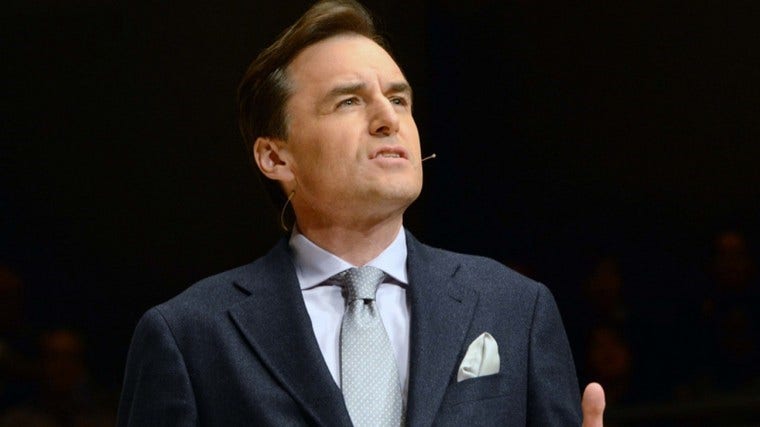The “Krugman Consensus” Haunts Munk Debate About the Future of Capitalism - Peter Diekmeyer (11/12/2019)

December 11, 2019
“Capitalism is in crisis,” say Canada’s lettuce-munching, wine-drinking elites who jammed Roy Thompson Hall last week to debate free markets.
“More and more fellow citizens have come to believe that the system no longer works,” notes Rudyard Griffiths , host and organizer of the Munk Debate series, which provides Canadians with opportunities to reflect on key issues.
“They believe that capitalism is poisoning the planet,” says Griffiths. “They worry about how capitalism is concentrating the power in the hands of wealthy elites.”
The questions raised in the debate, which was broadcast on CPAC, were good. However, the scope was limited by the ghost of what we call the “ Krugman Consensus .”
This body of global economic thought, led by New York Times columnist and Nobel laureate Paul Krugman, broadly argues that government management of the economy generates “the greatest good for the greatest number of people.”
Indeed the panelists all tacitly accepted this misguided approach, which has justified continued growth in government spending, taxation, and debt financing at a pace that is faster than economic growth for the past three decades.
The result was an incomplete performance, which left key issues off the table.
Stagnant wages, rising inequality
The high-powered panel Griffiths assembled summarized key issues well.
Yanis Varoufakis, the former Finance Minister of Greece, cited unsustainable debts, brazen authoritarianism, and catastrophic climate change as key issues.
“Capitalism’s main problem is with itself,” says Varoufakis. “It is undermining humanity’s capacity to share prosperity. We have the highest level of savings in history and the lowest level of investment into things that are necessary for human dignity.”
Katrina vanden Heuvel, long-time publisher of The Nation magazine, decried four decades of stagnant wages in America despite a dramatic increase in education levels.
Vanden Heuval cited a recent agreement by two hundred business leaders—that corporations need to favor stakeholder returns over outright profits—as a sign of growing recognition of the system’s failures.
Holding a debate about capitalism … without inviting any capitalists?
Holding a debate about capitalism without inviting any actual capitalists seems odd.
Mark Skousen, Martin Armstrong, Jeff Deist, or any number of Misesian or Austrian economics scholars would have made the obvious point: governments dominate the commanding heights of the global economy.
Public sector officials overtly manage consumer prices, manipulate stock and bond markets, spend or transfer wealth in excess of 60% of GDP, and intervene in every single financial transaction.
Put bluntly: there is hardly a single free market left in the western world.
The Krugman Consensus: the greatest good for the greatest number of elites…
Worse, contrary to its lofty goals, the Krugman Consensus appears to be generating the greatest amount of good for the greatest number of elites (not the ordinary folk it claims to champion).
Governments, the big banks, and car companies were all bailed out after the last financial crisis.
If capitalism existed in Canada, those institutions would have been wiped out in their current form and replaced by more efficient bodies.
Indeed government bailouts of the gas-guzzling automotive sector, coupled with secret subsidies provided by suppressed interest rates, likely held back development of the electric car industry by nearly a decade.
New York Times columnist David Brooks accidentally stumbled into the truth when he noted that public sector officials—even bright ones—are unable to make effective decisions because they lack the price signals that free markets provide.
Indeed the audience voted down the debate resolution, which stated that while capitalism was broken, it was time to try something new.
Maximum misery for the greatest number of ordinary folk
However, the tragic effects of the Krugman Consensus could be seen most clearly on Arthur Brooks, arguably the brightest debater on the stage.
Brooks, a former musician and head of the American Enterprise Institute, argued that globalization, free trade, property rights, the rule of law, and culture of entrepreneurship “pulled two billion people out of poverty.”
That is only partly true.
In truth most were trickle-down beneficiaries of $200 trillion worth of public sector, business, and household borrowing and spending.
One day, sooner rather than later, those debts will need to be repaid.
When that happens, many of those two billion people will be pushed right back where they came from.
Indeed the legacy of the Krugman Consensus is that it might end up creating “maximum misery for the greatest number of people.”
None of the presenters on the Munk Debate stage pointed any of this out.
Which suggests that you can’t have an effective debate about capitalism … without inviting capitalists.
Don’t miss a golden opportunity.
Now that you’ve gained a deeper understanding about gold, it’s time to browse our selection of gold bars, coins, or exclusive Sprott Gold wafers.

About Sprott Money
Specializing in the sale of bullion, bullion storage and precious metals registered investments, there’s a reason Sprott Money is called “The Most Trusted Name in Precious Metals”.
Since 2008, our customers have trusted us to provide guidance, education, and superior customer service as we help build their holdings in precious metals—no matter the size of the portfolio. Chairman, Eric Sprott, and President, Larisa Sprott, are proud to head up one of the most well-known and reputable precious metal firms in North America. Learn more about Sprott Money.
Learn More
You Might Also Like:











Looks like there are no comments yet.